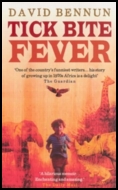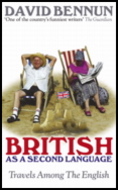| Text to separate 1 |  | Text to separate |  |
| Text to separate 1 | Tick Bite Fever | Text to separate | British As A Second Language |
|
Available now from Ebury Press:
British As A Second Language More details here Click here to buy it Also published by Ebury: Dave's highly acclaimed African memoir Tick Bite Fever |
| Tracy Chapman/ The Clash/ Calexico [The Mail On Sunday, 2003] TRACY CHAPMAN Brighton Centre **** THE CLASH THE ESSENTIAL CLASH Columbia ***** CALEXICO FEAST OF WIRE City Slang **** IT'S HARD to think of Tracy Chapman without also thinking of earnest collegiate types in wholemeal sandals and vaguely ethnic woolly hats. So it was with a sinking heart and heavy tread that I trudged down to the Brighton seafront to view Ms Chapman in concert. The most prominent lettering on my ticket read: “STRICTLY NO SMOKING (and no fun either)”. Or at least it did after I'd embellished it, while waiting for the show to start amid the convocation of social workers, basket weavers and stress counsellors gathered in the stalls. On tonight's evidence, when Chapman sings of “the line that separates whites from blacks”, that line might easily be drawn across the front of the stage. So why did I come? Because I remember Chapman's first, sublime hit, Fast Car, and it would be insolent to dismiss the woman who wrote it as no more than a worthy dullard. And also because her first full British tour, after six albums, is sold out across the board. Chapman still matters very much to a lot of people. Her latest CD, Let It Rain, left me puzzled as to the reason. It's pretty enough, but like most of her records it meanders freely across that greyest of areas, the one between the subtle and the insipid. Well, it turns out that I'm wrong as wrong can be, and perhaps even a bit wronger than that. Chapman, rapturously received from the off, delivers a performance of such fierce and focused intensity that it illuminates her oeuvre from within. These must be the songs as they were meant to be heard. On Say Hallelujah and Another Sun, Chapman echoes both the sombre composure and the grainy contralto of 60's gospel-folk great Odetta. Baby Can I Hold You, a near-flawless piece of pop craft, has restored to it all the bittersweetness leeched out by Boyzone. On record, You're The One has a certain fey jollity; here it's beefier and more ambiguous. It could be an anthem for those (among them several of my own friends) who habitually choose their lovers from the growing ranks of the functionally insane. Fast Car is Born To Run without the bombast, a quiet hymn to dreams of escape - and it evokes another Springsteen song, The River, in which those dreams are slowly ruined. As the evening builds into a barnstorming rock-out, the similarities to Springsteen become ever more pronounced. At their best, both portray archetypal American lives from ground level, combining broad brushstrokes with telling detail. In this light, Talking About A Revolution sounds more callow than ever. Maybe on the campuses which provided Chapman's first fanbase, they talk about revolutions, but the folk who inhabit her most impressive work fight tyrannies far more mundane than governments. An extended Stars In Their Eyes encore (tonight, Matthew, I'm going to be Bob Marley and Tina Turner) is sluggish and embarrassing, and reinforces my conviction that only people who play reggae all the time should be allowed to play reggae at all. But even that can't take the shine off this extraordinary show. If you don't like The Clash, then patently you have no interest in or affection for rock and roll, and frankly I'm surprised you've read this far. If you do, you won't need me to reiterate their qualities. What you may want to know is whether The Essential Clash lives up to its name. Many would demand that a collection so titled should encompass everything up to and including all six sides of the vast Sandanista LP. That would be a tad impractical. But this two-CD selection makes a fair fist of the impossible task of pleasing everybody. It delves comprehensively into the rabidly cherished early material, balances hit singles and popular favourites with cultish relative obscurities, and features only one track (and that perhaps for form's sake) from the record on which they finally outstayed their welcome, Cut The Crap. It should be pointed out that The Essential Clash was compiled by the band members themselves. It was intended to coincide with their induction into the Rock and Roll Hall of Fame, rather than to cash in on the lamentably early death of frontman Joe Strummer. Working your way through The Clash's progress is thrilling as always. It reminds you that right from the start they were really a classic rock act, who marched under punk's banner as a flag of convenience. Also, that the breadth of their musical reach marks them out as perhaps the only band in history to whom my above stricture on reggae doesn't apply. The dusty town of Calexico perches on the American side of California's southern border, a few miles from Mexicali. Joey Burns and John Convertino, once sidemen in desert-dwelling Arizona maverick Howe Gelb's Giant Sand, have adopted the name for their own band. If Giant Sand were pioneers of what's now called alt.country, then Calexico can best be described as alt.western. Their sweeping, plaintive sound blends horse opera soundtracks, mariachi and the shuffling, slumberous atmospherics of Oklahoma's JJ Cale, and does so with such clarity and vigour that it never seems merely the sum of its parts. Feast of Wire is the band's fourth album and a wonderful piece of work it is too, stripping Mexican music of its kitsch veneer and uncovering its true emotional impact. Occasionally it veers into abstraction, but for the most part it's gripping. It summons up the American west as it was, as it is, and as the movies would have it; wide and desolate spaces haunted by myth and dotted with hard little clumps of real life. Across The Wire (Widescreen) feels overtly cinematic, as promised in its title, but deals with the thoroughly unromantic existence of the “illegals” who head north from Mexico. Black Heart is a southwestern match for Portishead at their finest. Pepito and Close Behind are ravishing instrumentals, highlighting the fact that Feast of Wire is a record delicately but never blandly executed. All material on this site is copyrighted © to David Bennun and may not be reprinted or reused without permission. Alas, it's true. Back to Music Reviews
Back to Pop |
| Text to separate 1 |  | Text to separate |  |
| Text to separate 1 | Tick Bite Fever | Text to separate | British As A Second Language |